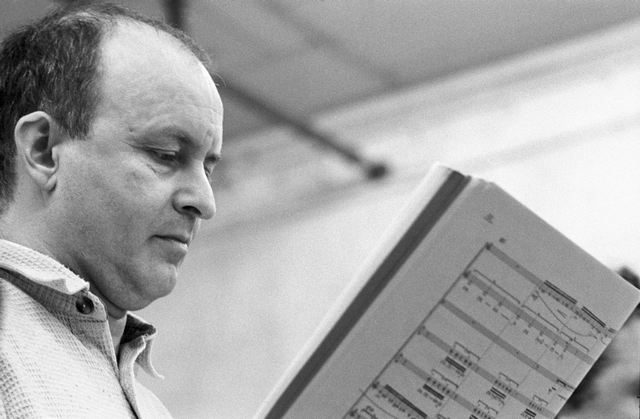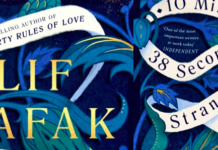
One of the most intriguing programs of the IKSV Istanbul Music Festival was without a doubt the evening that featured the renowned Russian composer Alexander Raskatov, where we had the chance to experience three amazing masterpieces of his. Before the performance, we were also able to catch him in a live interview by no other than one of my favorite journalists, Alexandra Ivanoff — a classical music critic for one of Turkey’s main English newspapers. The interview took place in the cloister of the ancient St. Irene Church, and allowed us more insight on the artist. For instance, it was during the interview that we learned that his talent and compositions had taken him outside of the borders of his homeland, and that he now resides in France, touring year-round all over the world. I make specific mention of this because in answer to a related question, he confirmed that “internationalism” influences his music, compositions and the way he looks at life. “Even the way that the birds sing varies country to country… and thus varies the way we hear, interpret and make music,” he said. As a global nomad with a multitude of cultures in my background, I liked him already!
Half an hour later, I had taken my seat in the front row of the St. Irene balcony: the perfect seat, providing a bird’s eye view of the Sinfonia Varsovia (the symphony in residence of the festival), the viola star Yuri Bashmet and the magnificent Warsaw Philharmonic Choir in the second interval — with Aneta Kapla-Marszalek as the soprano, Anna Fijalkowska as alto, Jakub Burzynski as the counter-tenor, Tomasz Warmijak as the tenor and Przemyslaw Zywczok as the bass soloist.
The first piece, the concerto for viola and orchestra titled “Path,” was composed by Raskatov specifically with Bashmet in mind. Bashmet is an equally renowned composer, violinist and violist of Russia. If you follow the classical music scene, you know of him already. And, even if you don’t, there is a chance that you have seen him perform: He was among the solo performers of the closing ceremony at the Sochi Winter Olympics a few months ago. Yes, he is all that.
“Path” with Bashmet consisted of five movements. It started off with Bashmet’s viola solo accompanied by the xylophone and trombone, and the birds of the Topkapı Palace grounds singing in the background added a unique touch. The piece, however, was nothing like birds singing. The promised world premiere of “Crying in the Wilderness” was not due until the second interval, and the viola concerto already seemed to warm us up for it: The style of composition was totally different from the norm. It was full of mystique, suspense and even bordered on eeriness. Bashmet performed tremolos on the viola; percussions marched in intense suspense. “Path” seemed to me like a walk in an eerie park. In the final largo doloroso (large and painful) movement, Bashmet extracted notes and tremors of pain from the viola, as Sinfonia Varsovia accompanied in sync. It was a unique experience, where Raskatov had chosen not the path of pleasure, but of mad creativity.
“The Season’s Digest” started with a long, loooong sustained note of the strings: the opening note of Tchaikovsky’s “The Seasons.” Similarly, it consisted of 12 short pieces, each dedicated to a month, and it was as intriguing as “Path.” Sudden crescendos climaxed in a cornucopia of instruments and then diminuendoed into silence. Notes were used sparingly, and the compositional theme seemed based not on melody, but on sound.
Its final piece, the Christmas-themed “December,” ended with the orchestra in silence and the speakers plugged in for recorded playback of instrumental music. The applause came not for the pleasant perfection to be found in a piece of Mozart or Bach, but in appreciation for and awe of the creative genius who had just taken us on a journey of uncharted territories in classical music.
In the second half, we were to discover that “Path” and “The Season’s Digest” were just the warm-ups for “Crying in the Wilderness.” In the interview, Raskatov had said that the worst thing ever was to be uttering a cry — a cry in the wilderness — but not having anyone around to hear it. The script of this composition was based on the ancient texts of Ephrem the Syrian, a poet and Christian figure of the fourth century. It was words uttered by the human sinner, talking of “fear, despondency, pride and malice,” of sins, and “horrible and awful places.” The sopranos sang of the end of one’s self, and asked the sinners “not to sleep” while they “prayed with tears.” The Warsaw Philharmonic Choir sang equally chilling notes and melodies. I took delight in this new adventure, but could also not help noticing quite a few “confused” looks. Amid the applause, I heard several people turn around and ask their neighbors whether they had “enjoyed” it. I myself got asked that question twice. Frankly, the music was not “delightful.” But it was delightful to experience such a thriller of a composition and creative madness. It was certainly one of the most memorable evenings of the IKSV Istanbul Music Festival.











[…] the Warsaw Philharmonic Choir; the highlight of the program was composer Raskatov’s Crying in the Wilderness. This year, Bashmet performed with the Moscow Soloists, an ensemble that he established in 1992 to […]